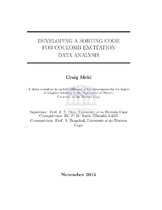| dc.description.abstract | This thesis aims at developing a sorting code for Coulomb excitation studies
at iThemba LABS. In Coulomb excitation reactions, the inelastic scattering
of the projectile transfers energy to the partner nucleus (and vice-versa)
through a time-dependent electromagnetic field. At energies well below the
Coulomb barrier, the particles interact solely through the well known electromagnetic interaction, thereby excluding nuclear excitations from the process
. The data can therefore be analyzed using a semiclassical approximation. The sorting code was used to process and analyze data acquired from the Coulomb excitation of 20Ne beams at 73 and 96 MeV, onto a 194Pt target. The detection of gamma rays was done using the AFRODITE HPGe clover detector array, which consists of nine clover detectors, in coincidence with the 20Ne particles detected with an S3 double-sided silicon detector. The new sorting code includes Doppler-correction effects, charge-sharing, energy and time conditions, kinematics and stopping powers, among others, and can be used for any particle-γ coincidence measurements at iThemba LABS. Results from other Coulomb excitation measurements at iThemba LABS will also be presented. | en_US |

